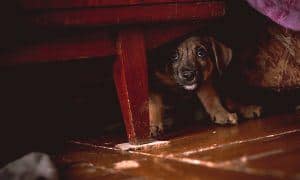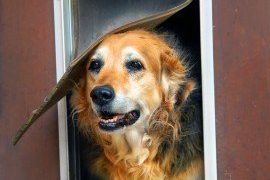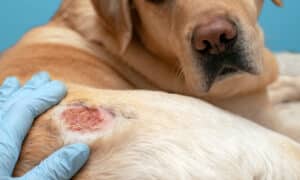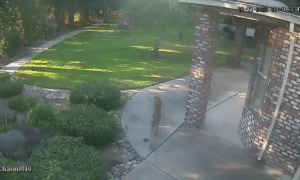“This post contains affiliate links, and I will be compensated if you make a purchase after clicking on my links.”
An upset stomach and purple poop. Those are just two of the symptoms reported by pet owners whose playful pooch decided those hidden fireworks were a tasty treat. Couple that with the terror that many pets experience from the thundering sound of fireworks, and July 4 can quickly change from a joyous celebration to a dangerous situation.
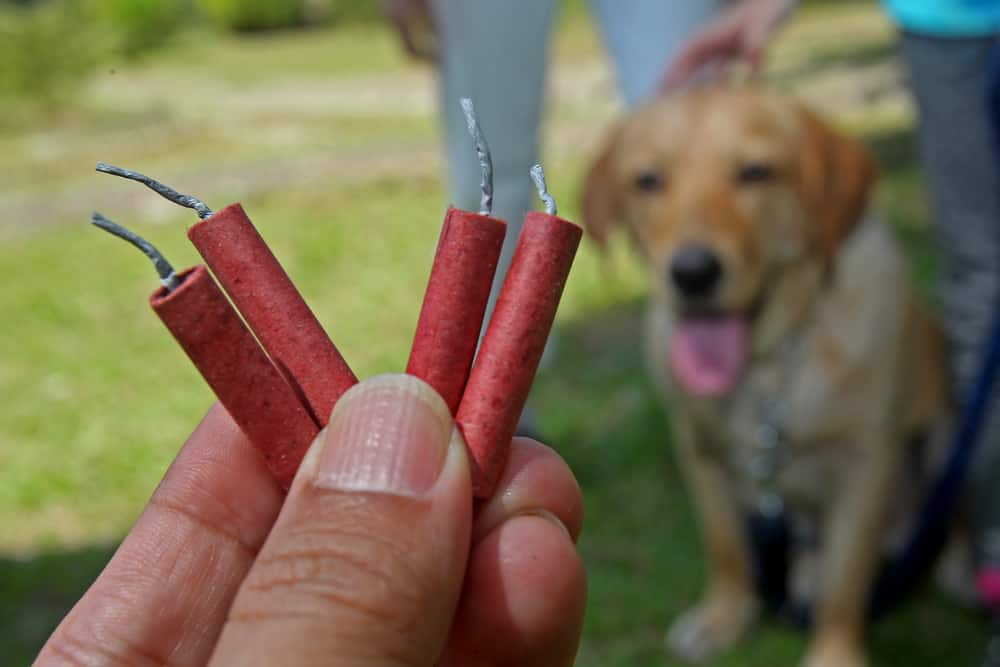
Each month the toxicology experts at Pet Poison Helpline highlight an interesting case in Toxin Tails, and this month leading up to Independence Day celebrations they are focusing on fireworks.
“Everyone knows that fireworks can be dangerous, especially when they are not handled correctly, and that includes a serious threat to your household pets” said Dr. Ahna Brutlag, a board-certified veterinary toxicologist at Pet Poison Helpline. “Although the ingestion of fireworks rarely leads to death, components such as chlorates (oxidizing agent), soluble barium (stabilizer), and colorants made from heavy metals can cause significant gastrointestinal (GI) irritation resulting in bloody vomiting and diarrhea, too low or high blood potassium, red blood cell destruction, and other organ damage. People put fireworks and other explosive products in what they think are out-of-reach places, but pets can sniff them out.” Even if you don’t have fireworks in your own home, it is important to watch for used fireworks material when out for a walk with your pet.
One such case involved a Terrier Mix puppy named Riley, who chewed apart two smoke bomb cylindrical fireworks. Her owner, James Crossno from Hickory, NC, found the cardboard, wrappers, smoke bombs and one of the wicks torn apart on the ground with powder all over Riley and the floor.
“She pushed open my roommate’s bedroom door and found where he had hidden some fireworks,” explained Crossno. “She started ripping them up and eating a lot of the colored powder. After ingesting the material, she was more scared than anything. She stopped drinking, started vomiting and had diarrhea. It wasn’t pleasant for either of us.”
Crossno first called his regular veterinarian, who then referred him to an emergency clinic. The clinic then referred him to the toxicology experts at Pet Poison Helpline.
“They helped out quite a bit,” said Crossno about the Helpline recommendations. “I felt pretty comfortable after talking to them about the situation. They advised me with what signs to watch for, and fortunately I didn’t need to take her in to the hospital.”
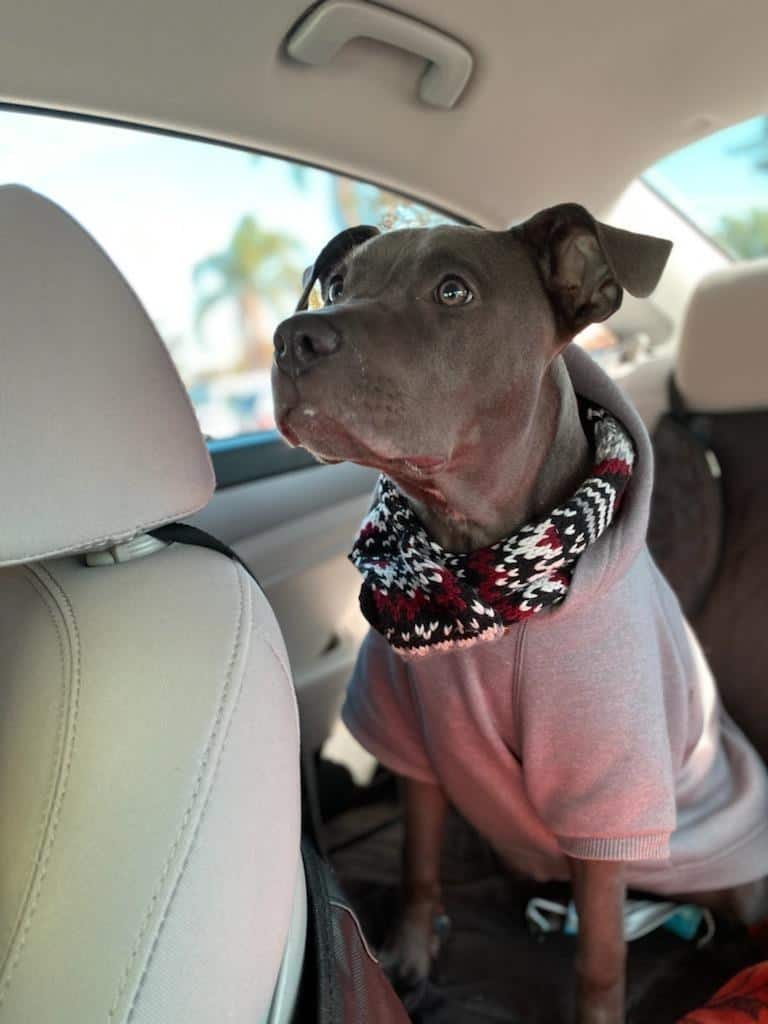
One symptom the Helpline team hadn’t seen before was bright purple poop. That’s what Jessica Silva witnessed after her Terrier Mix Luna ingested nine Whistling Bottle Rockets. She didn’t notice any immediate symptoms, but after three days Luna had a colorful surprise for her owner.
“My husband is way too comfortable bringing fireworks into our house,” said Silva. “I yell at him all of the time. He had hidden a stash of fireworks in a cabinet, but Luna found them and ate nine rockets out of a pack of 12. She didn’t seem to have any negative reaction, but three days later her poop was bright purple just like the packaging. It was a great color; I’m not going to lie. It was like she ate a pack of purple Skittles.” A call to Pet Poison Helpline reassured Silva that Luna would be fine but she should be kept under close observation. The call saved her a trip to the veterinary office.
Foreign body ingestion is only one of the risks facing pets during the July 4 holiday. An even greater threat is pets being terrified by the loud fireworks explosions or getting out of the house and into other dangers such as being hit by a car. Pet Poison Helpline has partnered with AKC Reunite, the nation’s largest not for profit pet recovery service, offering its 24/7 toxicology expertise as an optional, unlimited benefit for its members to add to their pet’s lifetime protection.
“According to AKC Reunite, more pets go missing during the Independence Day weekend than any other time of the year,” said Brutlag. “In addition, PetAmberAlert recently posted that animal control offices and shelters see a 30-60 percent increase in lost pets between July 4-6, with July 5 being one of the busiest days for shelters. Unfortunately, only about 14 percent of lost pets are successfully reunited with their owners.” AKC Reunite has six tips for protecting your pet this Independence Day.

Tip 1: Establish a Place of Sanctuary
Make sure your dog or cat always has access to a comfortable, quiet and safe place to hide. Either a closet, under a piece of furniture, or in his crate.
Tip 2: Make Toys and Long-Lasting Treats Available
Keep toys and long-lasting treats in your pet’s safe area to make the area more fun and to provide distractions from loud noises and flashes.
Tip 3: Exercise Earlier in the Day is Key
Make time to exercise your pet during daylight hours; then, keep them safely indoors before the fireworks begin.
Tip 4: Turn Up the Music, but Not Too Loud
At dusk, close your windows and curtains and turn on music or the television to muffle the loud noises that accompany social gatherings and the booming thunder from fireworks.
Tip 5: Watch Their Body Language:
Pets convey fear by shivering, cowering, tucking their tail between the legs, and averting their eyes. Looming over a fearful dog will only make it more anxious; and unless a dog is likely to get hurt it is usually best to leave a fearful dog alone because its behavior when scared is uncertain. And, never punish a pet if they are scared.
If your pet has a demonstrated history of noise phobia, contact your veterinarian. There are helpful calming medications that you can give to your pet an hour or two before the fireworks begin.
Pet Poison Helpline created Toxin Tails to educate the veterinary community and pet lovers on the many types of poisoning dangers facing pets, both in and out of the home. All the pets highlighted in Toxin Tails have been successfully treated for the poisoning and fully recovered.
About Pet Poison Helpline
Pet Poison Helpline, an animal poison control center based in Minneapolis, is available 24 hours, seven days a week for pet owners and veterinary professionals who require assistance treating a potentially poisoned pet. The veterinarians and board-certified toxicologists provide treatment advice for poisoning cases of all species, including dogs, cats, birds, small mammals, large animals and exotic species. As the most cost-effective option for animal poison control care, Pet Poison Helpline’s fee of $65 per incident includes follow-up consultations for the duration of the poison case. Pet Poison Helpline is available in North America by calling 800-213-6680. Additional information can be found online at www.petpoisonhelpline.com.






